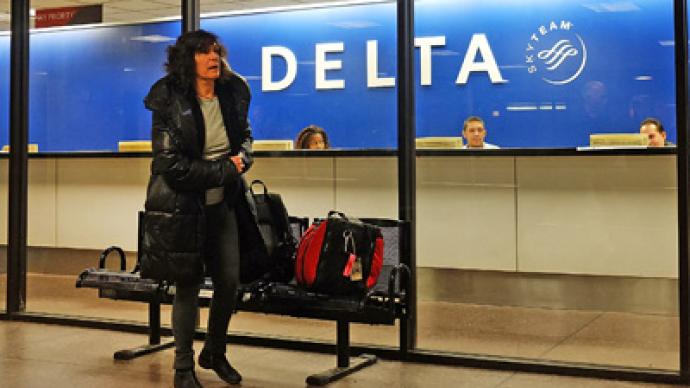Israel bars activist as ‘terrorist’ for refusal to open e-mail

An American peace activist entering Israel has been ordered by airport security officers to open her e-mail account. When she refused, they alleged she is a terrorist and sent her back to the US the next day. Her experience is not unique.
When Sandra Tamari, a Quaker peace worker, came from St. Louis to Israel to participate in an interfaith conference she expected some security delays. During past campaigns, she had called for boycotts and divestments targeting Israel. However, she was startled when a guard ordered her to open her Gmail account. She said the officers found out the address while going through her personal papers.“That's when they turned their (computer) screens around to me and said, ‘Log in,’” she recounted.When Tamari refused to do so, an interrogator said “Well you must be a terrorist. You are hiding something.”Tamari said she was searched, placed in a detention cell and flown back to the United States the next day.“The idea that somebody my age, a Quaker, on a peace delegation with folks from the US, would be denied entry; that never crossed my mind,” she stressed.Najwa Doughman, a Palestinian-American from New York City said she experienced a similar ordeal several days later, when she went to Israel on vacation.An interrogator told her to open her Gmail account, saying she would be deported if she failed to do so.“She typed in gmail.com and she turned the keyboard toward me and said, 'Log in. Log in now’,” Doughman recalls “I asked, 'Is this legal?' She said, 'Log in.”Doughman said the interrogator searched for key words such as “West Bank” and “Palestine” and made fun of a chat in which Doughman discussed a graffiti she had read on Israel’s barrier with the West Bank. The agents also reportedly copied out the e-mails of Doughman’s friends.Doughman and her traveling companion, Sasha al-Sarabi, said they were both approached because of their Arab names. They were repeatedly questioned over whether they had planned to visit the West Bank and participate in anti-Israeli demonstrations.Acknowledging that she had been a member of a Palestinian activist group in college, Doughman stressed that her trip to Israel was purely for vacation.“The interrogator asked me, 'Do you feel more Arab or more American? … Surely you must feel more Arab’,” Doughman recounts “I told her I was born in the US and studied there, but she didn't like my answer.”After hours of questioning the two women were denied entry. They said they were subjected to strip searches, placed in a detention center and sent back to the United States the following day. They also stressed that they weren’t allowed to call the US embassy.A US embassy spokesperson said the mission does not comment on specific cases, but indicated that the embassy is “usually” contacted when an American citizen is barred from entering Israel or any other country.Israel has been increasingly strict in letting international activists onto its territory following a 2009 incident, in which nine Turkish activists in a flotilla trying to break the blockade of Gaza were killed by Israeli naval forces. Since then, Israel has prevented hundreds of activists traveling by boat or plane from entering, sometimes reportedly using social media accounts on Facebook and Twitter to identify campaigners beforehand.Diana Butto, a former legal advisor to the Palestinian Authority and a fellow at the Harvard Kennedy School of Government, said e-mail checks, especially of people of Arab or Indian descent, were on the rise, with entry denied in most cases.Butto said authorities typically want to check the people’s itineraries, the articles they had written or their Facebook status updates.“The problem is there's no way to honestly say you're coming to visit the West Bank without falling into some type of security trap,” she said. “Either you lie and risk being caught in a lie, or you tell the truth … and it's not clear whether you'll be allowed in.”














